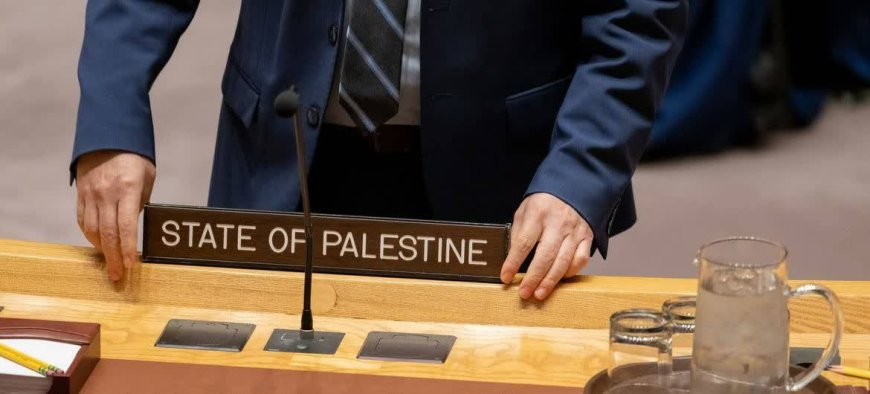A Nation's Bid for Statehood: US Veto Power Blocks Palestinians' Aspirations for an Independent Homeland

The Palestinian people, in their relentless pursuit of justice and self-determination, have undertaken considerable efforts to restore their rights in the aftermath of World War II. A salient manifestation of this struggle emerged in the form of the Palestine Liberation Movement, which initially gained recognition at the United Nations as an observer. Subsequently, the movement transitioned to a position of permanent observer, granting it expanded rights and privileges. In an endeavor to address the unique circumstances surrounding Palestine, the UN General Assembly adopted Resolution 52/250, thereby designating the situation faced by Palestine as "abnormal or extraordinary."
On September 23, 2011, President Mahmoud Abbas, the head of the Palestinian Executive Committee, penned a letter to the Secretary-General of the United Nations, formally requesting Palestine's full membership within the international body. Such membership is contingent upon acceptance by both the Security Council and the General Assembly. During the UN Security Council's deliberations on the membership application, the admissions committee undertook a comprehensive review. Cognizant of the high likelihood of veto by permanent Council members, it was deemed more pragmatic to pursue non-member observer state status within the General Assembly. Accordingly, Resolution 67/19 was adopted in 2012, officially recognizing Palestine as a non-member observer state.
In recent weeks, the Palestinian Authority has officially petitioned the UN Security Council to reconsider their 2011 request for full membership within the organization. The hope was for the Security Council to make a decision at the ministerial meeting on April 18, dedicated to addressing the Middle East. Nevertheless, on that fateful day, the United States exercised its veto power to dismiss the Algerian draft resolution endorsing the acceptance of the State of Palestine as a member of the UN. While twelve Security Council members voted in favor of the resolution, Britain and Switzerland abstained, and with the U.S. veto, Palestine's recognition by the United Nations was effectively stymied.
Ironically, despite senior US officials, such as Antony Blinken and Joe Biden, expressing support for a two-state solution following the October 7 war, the U.S. veto cast doubts on the sincerity and veracity of their stance. Citing sources within the US government, Axios reported that Blinken had directed his department to review relevant studies on the international recognition of a Palestinian state, underscoring a potential avenue for advancing the peace process. In an interview, President Biden himself acknowledged the existence of various models of a two-state solution, taking into consideration the unique circumstances faced by different member states of the United Nations. These deliberations sparked discourse within the American media, shedding light on the divergent positions between the United States and the Israeli regime and highlighting the latent crisis surrounding the statehood aspirations of Palestine amid the ongoing war crimes and atrocities in the Gaza Strip.
Yet, it becomes increasingly apparent that such US positions and subsequent media coverage serve primarily to restore the United States' standing in the Middle East. Since the October 7 war, the Biden administration has consistently aligned itself with the Israeli regime, providing copious aid and support. The recent Algerian resolution veto exposes the disingenuous nature of American posturing towards the two-state solution. In fact, these positions appear designed to bolster the credibility of Israeli Prime Minister Netanyahu, whose staunch opposition to a demilitarized Palestinian state is widely known, solidifying his support within Israel.
In essence, the United States' proposal of a two-state solution appears disingenuous, a calculated effort to deceive regional and global public opinion and accrue political gain for both the U.S. administration and Netanyahu. Through the most recent veto, the world witnessed the United States preventing the recognition of the State of Palestine and, in doing so, conveyed the message that Palestine isn't even willing to seek membership in the United Nations. This unequivocally demonstrates that the United States cannot be relied upon, and it betrays the fact that decisions regarding Israel from the White House are often dictated by the government in Tel Aviv.
This episode reinforces the notion that, notwithstanding the US power of veto, the United Nations is an authoritative organization that lacks effectiveness and executive guarantees in moments of critical juncture. The existence of a permanent Palestinian population has been unequivocally acknowledged in the advisory opinion of the International Court of Justice. Resolution 181 has clearly established the boundaries of the land element. The formation of three branches of governance in Palestine subsequent to the Oslo Accords and the conduction of popular elections to shape this political structure further testify to the establishment of the Palestinian government in the international arena. Furthermore, with over 130 nations recognizing Palestine and more than 100 extending diplomatic relations, doubts should not persist concerning the formation of an independent Palestinian state on the international stage. Yet, regrettably, the right to veto remains as an instrument of Palestinian disenfranchisement.












































